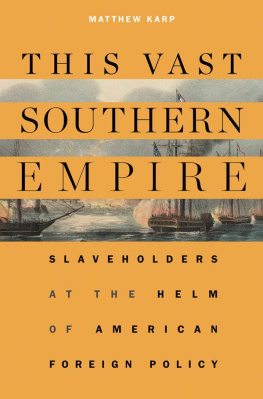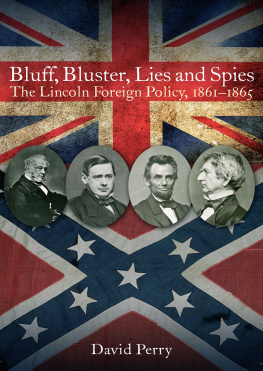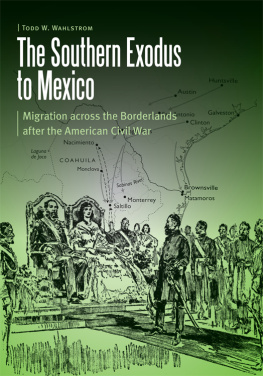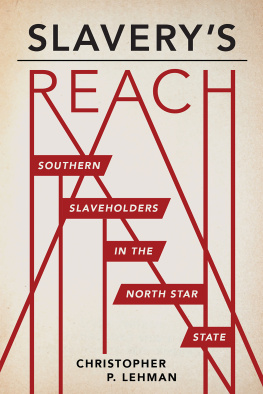THIS VAST SOUTHERN EMPIRE

Slaveholders at the Helm of American Foreign Policy
Matthew Karp


Cambridge, Massachusetts, and London, England
2016
Copyright 2016 by Matthew Karp
All rights reserved
Jacket illustration: The Naval Bombardment of Vera Cruz, March, 1847. Lithograph by N. Currier, Courtesy of Beinecke Rare Book and Manuscript Library of Yale University
Jacket design: Tim Jones
978-0-674-73725-9 (alk. paper)
978-0-674-97384-8 (EPUB)
978-0-674-97382-4 (MOBI)
The Library of Congress has cataloged the printed edition as follows:
Names: Karp, Matthew, 1981 author.
Title: This vast southern empire : slaveholders at the helm of American foreign policy / Matthew Karp.
Description: Cambridge, Massachusetts : Harvard University Press, 2016. | Includes bibliographical references and index.
Identifiers: LCCN 2016009232
Subjects: LCSH: SlaveryGovernment policyUnited StatesHistory. | SlaveryPolitical aspectsUnited StatesHistory. | United StatesForeign relations17831865. | United StatesPolitics and government17831865. | Power (Social sciences)United StatesHistory.
Classification: LCC E183.7 .K345 2016 | DDC 306.3 / 62097309033dc23
LC record available at http://lccn.loc.gov/2016009232
For my mother, Freddi Karp
Contents
In the foreign, as in the domestic,
policy of the United States,
the interest of the slaveholders
served as the guiding star.
Karl Marx, 1861
THE STRUGGLE OVER THE FUTURE OF SLAVERY spanned the nineteenth-century world. For centuries the toil of enslaved African workers had formed the backbone of a colonial economy that stretched across the Atlantic Ocean. Then the great revolutions at the close of the eighteenth centuryAmerican, French, Haitianunleashed social forces and political ideas that offered a sweeping challenge to slave labor. Over the next several decades, slaverys wide-ranging opponentsrepublican lawmakers, liberal reformers, rebellious bondspeople themselvesachieved a number of major victories. Some New World states and provinces, from Chile to Vermont, abolished slavery altogether; others, like Pennsylvania and Peru, took measures that aimed at gradual emancipation. In 1833 abolitionists claimed a further triumph when the greatest power in the world, Great Britain, passed a law that announced the end of slavery in its remaining American colonies.
Yet for all the momentum of antislavery politics, the three largest slaveholding societies in the worldthe Spanish colony of Cuba, the Empire of Brazil, and the United States of Americaremained firmly committed to black servitude. At the midpoint of the nineteenth century all three flourished as never before, exporting unprecedented quantities of cotton, sugar, and coffee to the industrializing economies of the North Atlantic. British emancipation notwithstanding, the total value of trade in slave-produced goods nearly doubled between 1820 and 1860. By the start of the American Civil War, six million men, women, and children toiled in bondage, the largest number in the history of the Western Hemisphere.
Although the transatlantic abolitionist movement declared with increasing vehemence that human bondage had no rightful place in modern life, the planters and politicians who presided over slaverys boom saw no reason to abandon the field. On the contrary, slaveholders grew increasingly confident about the strength of their position within the mid-nineteenth-century world order. In an era marked by global economic expansion and fierce political collision, the fate of chattel slavery remained very much undecided. As both proslavery and antislavery forces scrambled for advantage, the shock waves of their struggle spread far beyond the traditional nodes of the Atlantic basin. Farmers, migrants, merchants, and soldiers from Ottoman Turkey, Qing China, British India, and Mexican California found their worlds affected by the international contest over slavery.
No wonder American abolitionists believed that national arguments about bondage had global consequences. This question of Slavery does not concern America alone, proclaimed the Massachusetts minister Theodore Parker in 1856. [A]ll Christendom is likewise party to the contest.
______
Not so long ago, it seemed self-evident that human bondage could not survive the mid-nineteenth century. Of course slave societies, including that of the South, were doomed, sighed Eric Hobsbawm as he settled in to consider the subject in The Age of Capital. By the 1850s, slavery as a factor in world history was patently on the decline, its economic muscle amputated by the spread of free labor, its social logic repudiated by bourgeois values.
Few mid-nineteenth-century Americans were more deeply engaged with international politics than southern slaveholders. A class whose main source of income derived from the global marketplace could not afford to isolate itself from the rest of the world. Compared with Maine dairy farmers, Michigan lumber dealers, or Pennsylvania iron makers, whose goods were consumed within national borders, cotton planters from Georgia to Texas were almost inescapably cosmopolitan in outlook. Yet the most powerful American slaveholders paid close attention to developments all around the globe in ways that went far beyond a desire to market their plantation exports.
Southern elites kept the international politics of slavery under constant surveillance, tracking threats to slave property across the hemisphere and monitoring oscillations in global attitudes toward emancipation. They carefully followed the course of world affairsnot only the storms of revolution and reaction in Europe, but also the steady growth of imperial influence in Africa and Asia. They stayed abreast of the latest developments in military technology and administration, from British naval armaments to French infantry deployments in Algeria. Above all, slaveholding leaders sought to keep pace with the constant strivings of the mid-nineteenth-century worldthe expansion of commerce, the march of empire, the advance of science, and the reshaping of state power.
Neither flaming hotheads nor desiccated reactionaries, Americas most powerful slaveholders were earthbound and waterbound men of the worldpractical visionaries who, in Hobsbawms phrase, thought in continents and in oceans. This does not mean that antebellum southerners were no different from the other bourgeois elites whose ambition and imagination gave shape to the Age of Capital. Unlike London financiers or New York railway executives, the leading men of the South could not envision a global future without the fundamental institution of African slavery. Their continents were to be civilized with the enforced toil of dark-skinned workers, and their oceans were to be opened as highways to the rich produce of bound labor.
But in the evolving world of the mid-nineteenth century, the Souths commitment to bondage made it distinctive, not irrelevant or obsolete. If there was little that was domestic about southern slave institutions, there was less that was peculiar. Enslaved Cuba and Brazil were also booming, and by 1850 even antislavery European powers had begun to experiment with new systems of racialized and coerced labor, from Dutch Java to the British West Indies. For the southern masters who celebrated it, slavery could claim a distinguished history, a flourishing present, and a glorious future. In both the American world they made and the global order they craved, southern elites understood the growth of slavery as no more and no less than the true progress of civilization.














